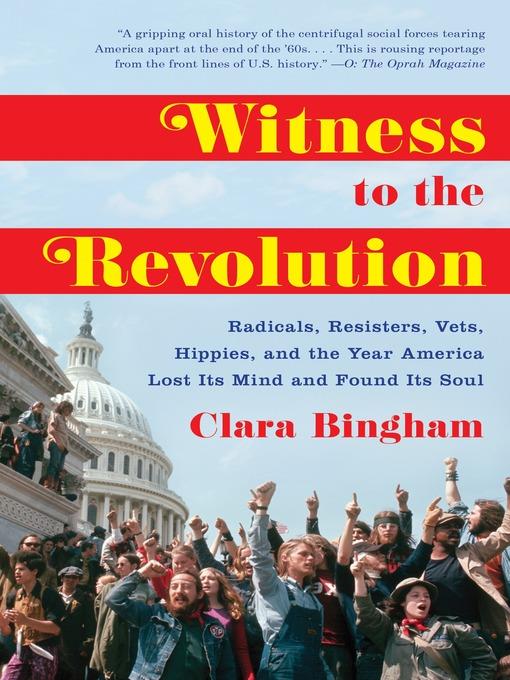
Witness to the Revolution
Radicals, Resisters, Vets, Hippies, and the Year America Lost Its Mind and Found Its Soul
کتاب های مرتبط
- اطلاعات
- نقد و بررسی
- دیدگاه کاربران
نقد و بررسی

Starred review from July 11, 2016
In this oral history of the American counterculture from August 1969 to September 1970, Bingham (Women on the Hill) assembles an impressive who's who of the activists, outlaws, and idealists who sought to bring America to its reckoning, for better or worse. Perhaps the most astonishing part of Bingham's account is the sheer number of memorable events that occurred in this "school year": Woodstock, Kent State, Nixon's invasion of Cambodia, the Weather Underground's campaign of bombings, Seymour Hersh breaking the My Lai massacre story, Robin Morgan publishing her feminist essay "Goodbye to All That," and Fred Hampton and Mark Clark being murdered by the Chicago police. Vietnam vets were coming out against the war and youths were opening their minds with LSD. It would be a mistake, however, to assume Bingham's book is an uncomplicated celebration of the "awakened generation." Many of the reminiscences end in regret; ironically, just as the New Left's antiwar message was beginning to hit home with the American public, the movement itself was self-destructing. By the end of Bingham's history it becomes clear that time has done little to cast these crucial events in any clarifying light. Agent: Esther Newberg, ICM.

Starred review from May 1, 2016
An engrossing oral history of the youth rebellion of the 1960s. Former Newsweek White House correspondent Bingham (Class Action: The Story of Lois Jenson and the Landmark Case that Changed Sexual Harassment Law, 2002, etc.) interviewed some 100 activists, veterans, government officials, and others--all now in their 60s and 70s--to produce this remarkable account of the anti-war movement. "The cross-pollination of left-wing activists with hippie drifters and dropouts, who were all part of the same Great Refusal to conform, created a brand new rebel," she writes. With a focus on the year 1969-1970--the "crescendo of the sixties, when years of civil disobedience and mass resistance erupted into anarchic violence"--Bingham captures telling moments (from campus protests to bombings, from Woodstock to My Lai) in the voices of those present. There are revealing stories about Weathermen on the lam, government sabotage and surveillance, courtroom theatrics, police riots, President Richard Nixon's late-night meeting with protesters at the Lincoln Memorial, the Pentagon Papers, and the incessant organizing behind events that "would profoundly and permanently change the nation." The cast is a who's who of the '60s: Daniel Ellsberg, Jane Fonda, Julius Lester, and others, from undercover FBI agents to rock musicians, most of whom offer sharp insights into the period. After all these years, many echo an LSD dealer's comments: "We were young and naive, and drunk on idealism." "We were so arrogant," says Weatherman Mark Rudd. Most share feminist Robin Morgan's observation that in the civil rights and peace movements, "the human spirit was really at its best." Weathermen founder Bill Ayers says he will apologize for his actions when Henry Kissinger says "what he did that was wrong, because he killed three million people, and I killed no one." People like Bingham (b. 1963), who "missed the party," may be astonished by aspects of this tumultuous story. Baby boomers will find themselves infuriated once again by vivid accounts of the My Lai massacre, the Kent State and Jackson State shootings, and other tumultuous events.
COPYRIGHT(2016) Kirkus Reviews, ALL RIGHTS RESERVED.

May 15, 2016
In her latest work, Bingham (Class Action) has compiled an assortment of oral histories ranging from August 1969 to August 1970. Organized into narrative form, the accounts capture volatile and revolutionary change, relaying a feeling for what it was like to live during this period. The material includes profiles of participants associated with the Black Panthers, the trial of the Chicago Eight in 1969, Kent State University in the wake of the 1970 shootings, the My Lai Massacre in 1968, the Nixon administration, the Pentagon Papers, the Weathermen, and Woodstock. Broader topics touch on the Vietnam War, the draft, domestic terrorism, and the peace and women's movements. Together the descriptions of events reveal the radicalness and turmoil of the era. Bingham's prose is often engaging and dramatic, transferring the experience of these times to readers. Additionally, the reports draw out the earnestness of the participants as players within this political and cultural conflict. VERDICT Recommended for readers of U.S. history.--Scott Vieira, Rice Univ. Lib., Houston
Copyright 2016 Library Journal, LLC Used with permission.

June 1, 2016
Vietnam, domestic bombings, marches, student strikes, political trials, Nixon, and the counterculture dominated U.S. news between August 1969 and September 1970. Former White House correspondent for Newsweek, Bingham (Class Action: The Landmark Case That Changed Sexual Harassment Law, 2002) captures the essence of these 14 months through the words of movement organizers, vets, students, draft resisters, journalists, musicians, government agents, writers, and others. Distilled from 100 interviews, these firsthand narrativesfrom Bill Ayers, Bernadette Dohrn, Daniel Ellsberg, and many morepaint a picture of life during the apex of anti-war, anti-government movements. Organized around major events, the stories are interspersed with striking photographs and government documents from the White House, FBI, and other federal offices. The individuals Bingham features led a seismic shift in American culture and politics that continues to resonate today. This oral history will enable readers to see that era in a new light and with fresh sympathy for the motivations of those involved. While Bingham's is one of many retrospective looks at that period, it is one of the most immediate and personal.(Reprinted with permission of Booklist, copyright 2016, American Library Association.)

























دیدگاه کاربران